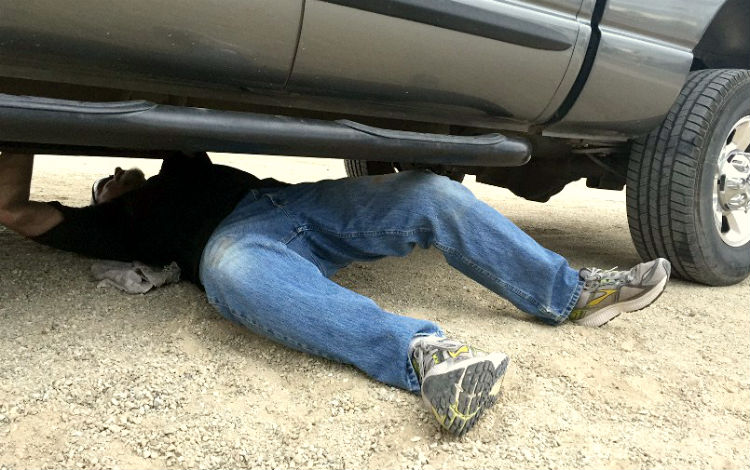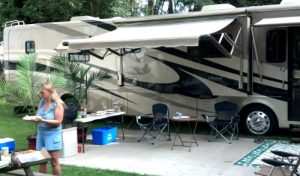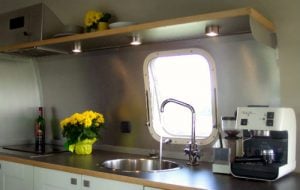Living in your RV gives you endless opportunities to learn more about yourself and your rig. As a bonus, you’ll learn how to have more fun while living with less.
Full-time RVing (or even if you travel extensively) has its share of challenges. But, if you’re mentally and financially prepared, you can get through any roadblocks. Here is some of the best full-time RVing advice to take along for the ride.

Full-time RVers share many common issues, like inevitable repairs.
Being a part of the full-time RVing community means you’re always among friends. If you have a RVing issue, odds are good that someone else has found a way to resolve it. Some common scenarios full-timers experience include:

Routines constantly change on the road. Photo by 1948boat iRV2.com member
Coping with new routines
There’s no way to prepare for dealing with how ordinary routines change with the miles. Grocery stores can differ from place to place or services may be limited.
Also, driving your RV through new towns every day can be a little confusing and it may take some time to adjust. No matter how stressed you get, if you laugh though these situations or any of those common RVing mistakes, you may never want to give up full-timing.
Adjusting to smaller galleys
Most full-timer RV kitchen layouts are nothing like you find in a home. Even in larger RVs appliances are smaller. Over time you’ll learn the essentials of full-timing, like the best way to organize your RV refrigerator, how to decide between appliances, and the importance of carrying multi-use kitchen gadgets. Be patient and you’ll create a more comfortable cooking environment that makes living on the road easier.

Any RV galley can take getting used to on the road. Photo by SmokelessJoe airforums.com member
Learning to travel slower
That old saying of “Hindsight is 20/20” is never more applicable than it is when you transition to full-timing. Eventually you’ll look back on all those lessons learned as newbie full-timers and appreciate your newfound freedom even more.
For example, most newbies rush through their destination bucket lists and miss lots of cool roadside attractions. Do yourself a huge favor and slow down. You’ll realize the silliness of living at such a fast pace.
Accepting that repairs are inevitable

Repairs can happen after time of the road so it’s best to prepare for the unexpected. Photo by michael13 airforums.com member
All RVs shake, rattle and roll their way into repair shops. Usually it happens at the worst possible time. Being mentally and financially unprepared for this reality results in a bad case of the full-timing fix-it blues.
To get through these inevitable times, always have a good financial cushion. Try working on the road or saving more money for emergencies. Do both and you’ll be ready to deal with mechanical issues.
Staying on top of maintenance
The cost of deferred maintenance is another full-timing budget item you may not anticipate. For instance, many full-time RVers quickly learn that RVs need repairs done faster than a house.
RVs don’t have the same construction materials, so ignoring things like uneven wear patterns on tires or water on the basement floor can cause irreparable damage. Always take action when your gut instinct says something is wrong.
If you have innovative RVing tips of your own contact us today, we’d love to share your best full-time RVing advice too.

Excellent article. I am a wanna be RVer. How much financial cushion?
a wannabe roadster here too …
been checking out almost everything on this website and similar ones for a few years now and have learned one very important item so far, among many others:
i wouldn’t go with large RVs and/or trailers of any kind although being a pro photographer with lots of extra gadgets i do need to carry around all the time, a bigger vehicle sounds almost like a MUST for me!
but they are much harder to maintain than a smaller motorhome or off-road SUV, truck, van or similar vehicles turned into a camper that is an all-in-one piece thing … besides, chances of car accidents with a trialer in-tow are much higher due to technical reasons! (riding a ‘horse drawing a carriage along’ is much harder to master -as well as slower- than when you’re riding only on a single horse …)
the larger machines require a lot of parking space when inside cities for example … and outside as well, which means they are mostly confined to RV parks … having been built for paved roads mostly, they’re not quite off-road friendly either! they are also not easy to pull in and out of gas (or electric) stations … (and the larger they are, it’s unlikely you get them in full electric format yet, unless you go for one of these latest Tesla and similar electric trucks, which are not cheap …) they consume way more gas and when it comes to repairs and stuff like that, well, you’d be needing ‘professional help’ unless you’re a good truck mechanic yourself …
last but not least, as a photographer, i need to pull off and park temporarily by the side of a road often times when i see a good view that’s suitable for photography … it’s not easy to do that with an RV or other huge vehicles, is it?
the other thing is costs …
it always sounds like it’s cheaper to live off the grid and in a ‘camping vehicle’ of some sorts … yes, true, but let’s not forget almost all the amount of money saved by not paying rent and other obligatory city / suburb expenditures, would now be spent on gas, mileage, repairs, services, tire replacements, higher vehicle and health insurance, unpredictible charges that may occur (accidents for example) and so on …
all n all, just think about all these and many more ‘details’ when seriously considering living on the road for any amount of time, especially if you’re thinking of becoming a full-time RVer …
i’m not saying one should quit the idea though … on the contrary, i’m still pursuing it strongly, reading and studying about it every single day and even if it costs me more than living the boring on-the-grid lifestyle i’m doing now, i’d still be doing it IF i can afford it … 🙂
Iam a newbie. I found out the hard way. To put push rods in front of each shelf. Of the refegarater…before your eggs in up on the carpet
Great article, especially the part about R.V.’s doing the shake, rattle and roll. It’s like your home in an earth quake. At 72, fighting cancer, and still loving the road, I’m on my fifth and last R.V. and as insane as it might sound, I bought an old one and spent ten thousand dollars fixing all the little (and big) issues. The good part is I now know most of the problems I won’t have and a few that might come up. The biggest difference this time …. no more Interstate Highways. Regardless of where we are headed, it will be on the old roads that still have a wealth of surprises and some great food and uncrowded R.V. parks. The only regret is that it has taken a serious illness and so many years to finally understand the real fun of going R.V. ing.
Taking the back roads if half of getting there. It is the pleasant surprises along the way that makes RVing fun. The community festivals, the church garage sales, and the quaint towns along the way. Taking the interstate you will by-pass these wonderful aspects of our glorious country.
When traveling I try to keep about 2 months income in checking/savings and at least one credit card available to charge at least $3,000. for unexpected repairs. I do not have a cell phone so I map things out with a maps I bought back in 2007. I always make a habit of stopping at hotels and visitor centers and picking up brochures and a local map (or state map). I always ask about any special events that I should make note of while I’m in the area. When I’m in a town shopping or dining I ask the same questions of anyone I can to get a flavor of the community.
Making repairs on your MH starts with searching on the internet with common problems with your MH model. Check the forums for your MH regarding issues RVers have had with their MH. Read about common repairs talked about in the forums. Learn what repairs you may have to do on your own and what repairs you may have to rely on a mechanic to do. Get an idea of what the costs might be.
Make sure you have a full set of tools with you, sockets, screw drivers, pliers, adjustable wrench, electrical tape, circuit tester, fuses, hack saw, and multiple screw driver tips for the different types of heads (start, hex, etc), and a set of Allen wrenches. Be Prepared… A good RV motto
Having a portable internet connection, “hotspot”, is essential in a variety of ways.
Lbrewer@astate.edu
new-be here
we have a older 27′ 5th wheel and a older 3500 diesel truck ..
i really want to take this on the road but,
my truck has been having problems going up hill 7% 8% grads
i was thinking that may be i should down size to make it easer to travel minimizing my road disasters
from the east cost to the Arizona BLM and sights …
If one runs a large RV motor-home , why not stay home !
Small is beautiful especially on the road, ask any trucker .
All said if you are financially prepared to blow a couple hundred simply for fuel ,the shut up & put up & pay.
Not my idea of living on the road , I would rather stay put at home & travel by plane.
Just my humble opinion.
Im confused if your not RV and your flying in a plane or your staying home …
why would you join in on RV life..
we had a class A i restored it was a 27′ alabama Red Bay 1990 i wish i never sold it now ..
it was very easy to drive. and now we have a 5th wheel and we are contemplating a cross country east to west… im not worried about the 5th wheel but my truck 2000 dodge 3500 dully.
braking down is a problem wondering what INS policy will cover the truck……